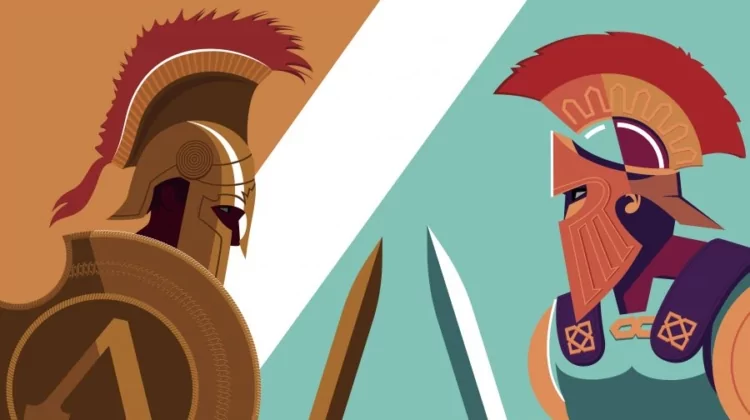
[Want even more content from FPM? Sign up for FPM+ to unlock exclusive series, virtual town-halls with our authors, and more—now for just $3.99/month. Click here to sign up.]
Michael Walsh’s A Rage to Conquer: Twelve Battles That Changed the Course of Western History is a masterful exploration of twelve pivotal conflicts that have defined the trajectory of Western civilization. In a narrative that blends his signature erudition, storytelling passion, and a deep reverence for the martial spirit, Walsh delivers a compelling case for the centrality of war in shaping the cultural, political, and spiritual contours of the West.
You may recall journalist, novelist, political pundit, and screenwriter Michael Walsh as the author of, among many other books, two essential ones on cultural Marxism which I reviewed – The Devil’s Pleasure Palace and The Fiery Angel – and, as David Kahane, of Rules for Radical Conservatives: Beating the Left at Its Own Game to Take Back America. The provocative Walsh has also appeared a couple of times on the Freedom Center podcast The Right Take with Mark Tapson (listen here and here).
The battles Walsh selects in his new book—from the semi-mythic fury of Troy to the grim resolve of 9/11—are not arbitrary. Each represents a fulcrum upon which the fate of Western civilization turned. Not merely a recounting of military tactics, this sequel to his 2020 book Last Stands: Why Men Fight When All is Lost (which I also highly recommend) offers a profound meditation on the human condition, the nature of leadership, and the enduring legacy of courage under fire. The book not only illuminates the past but also urges readers to view the present and future through the unflinching lens of war’s role in human progress.
Walsh begins with a nod to Carl von Clausewitz, the Prussian theorist whose seminal work On War frames the book’s philosophical underpinnings. Clausewitz’s famous assertion that war is a continuation of policy by other means resonates throughout Walsh’s analysis of these twelve transformative moments in the West’s cultural and civilizational evolution. These battles weren’t just about territory or power, but about the soul of the West itself.
At Gaugamela, for example, Alexander the Great’s audacious tactics against the Persian Empire laid the groundwork for spreading the ideals of Hellenistic culture across the known world. This victory, Walsh argues, seeded the philosophical and artistic foundations of the West. Similarly, Julius Caesar’s siege of Alesia in 52 B.C. cemented the Roman empire’s dominance and established a legal and administrative framework that would influence Western governance for centuries.
The Battle of Milvian Bridge in 312 A.D., where Constantine’s vision of the Christian cross heralded his victory, marks another turning point. Walsh portrays this clash as the moment when Christianity became a defining force in Western civilization, supplanting paganism and setting the stage for the medieval rise of Christendom. His analysis of Constantine’s strategic brilliance is matched by a keen awareness of the spiritual stakes, illustrating how this battle reshaped the West’s moral and religious landscape.
Likewise, the Crusader victories at Dorylaeum and Antioch, led by Bohemond of Taranto, weren’t imperialist land grabs, as the woke crowd loves to sneer; they were desperate, belated stands to keep Islamic expansion from overwhelming Christian Europe.
Fast-forward to Napoleon at Austerlitz in 1805. Walsh calls it Napoleon’s high-water mark, a victory so dazzling it not only solidified Napoleon’s dominance but reshaped European geopolitics and sparked the nationalist fires that would define the 19th century. His chapter on this battle is particularly noteworthy for its integration of cultural insights, drawing parallels between Napoleon’s strategic innovation and Beethoven’s revolutionary Eroica symphony, both of which broke new ground in their respective domains.
The battles of 20th-century warriors—Pershing at St.-Mihiel, Nimitz at Midway, and Patton at the Bulge—are equally compelling. Walsh highlights their significance in preserving Western liberty against the twin threats of imperialism and totalitarianism. Midway in particular is portrayed as a turning point in the Pacific theater, where American resolve and naval ingenuity halted Japanese expansion and reaffirmed the West’s commitment to freedom. Walsh’s analysis of Patton’s audacious counteroffensive during the Battle of the Bulge underscores the importance of decisive leadership in moments of crisis, a theme that resonates throughout the book.
A Rage to Conquer’s afterword, “Of the Battle of 9/11,” is a sobering reflection on the West’s faltering response to modern threats. Walsh laments the shift toward limited warfare since 1945, arguing that the failure to decisively confront adversaries has weakened the West’s resolve. This perspective is consistent with his broader thesis: that war, for better or worse, is a crucible for societal change and a test of civilizational vigor. His critique is not defeatist but a call to rediscover the clarity and purpose that defined earlier victories.
What sets A Rage to Conquer apart from most military histories is Walsh’s ability to weave in literary, cultural, and philosophical threads to demonstrate how these battles shaped the West’s soul. Progressives may bristle at his conviction that war is an intrinsic male pursuit or his dismissal of politically correct views on conflict, but his arguments are rooted in historical evidence and an acknowledgement of the bellicose reality of human nature. Walsh’s prose is simultaneously scholarly and page-turning, inviting readers to appreciate the stakes of each conflict and the broader implications for Western identity.
Apart from his storytelling skill and wide-ranging intellect, Walsh’s strength is his refusal to sanitize history, to avoid ruffling delicate sensibilities or dodging the eternal truth that war is, at its core, a masculine domain. This isn’t a book for Democrat models of “21st century masculinity” like Tim Walz or Doug Emhoff—it’s for those who believe our civilization is worth killing and dying for.
In an era when historical revisionism threatens to erode our sense of identity, A Rage to Conquer is a vital reminder that knowing our history isn’t a mere academic exercise; it’s a matter of survival. Understanding the clashes when courage and sacrifice altered the course of history equips us to confront the existential threats of today and tomorrow. Michael Walsh’s book is a battle cry for a culture under siege, to honor the heritage bequeathed to us by men who fought, bled, and won so we could inherit a civilization worth defending.
Follow Mark Tapson at Culture Warrior















